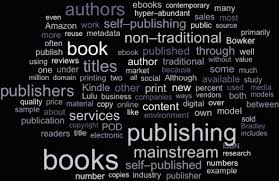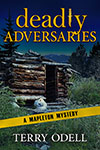by James Scott Bell
@jamesscottbell
 So here we are on a toboggan hurtling down the snowy mountain called 2022. Seems like a good time to take a look at the current state of book publishing, the better to avoid the rocks, tree stumps, and cliffs scattered all over the slope.
So here we are on a toboggan hurtling down the snowy mountain called 2022. Seems like a good time to take a look at the current state of book publishing, the better to avoid the rocks, tree stumps, and cliffs scattered all over the slope.
What do we see?
The Forbidden City
Looming large, as always, is traditional publishing by the Big 5. Prophecies of their demise, which were legion in the early days of the indie boom, have not come to pass. Not even a global pandemic could take the trad biz out. Yes, there have been mergers and acquisitions, the paring down of staffs, and other moves that market-wide disruption demands. But as explained by Jane Friedman in The Hot Sheet (subscription required; quoted with permission):
In 2020, traditional publishing celebrated its best sales in a decade, and 2021 will come in at even higher levels, with 8 percent growth projected by NPD BookScan. HarperCollins CEO Brian Murray claimed the book “pie” has grown by about 15 percent, and thus the company has been aggressive in their acquisitions and release schedule. HarperCollins profits were up 42 percent by mid-year, while Penguin Random House saw its best profits in 19 years, up by a whopping 55 percent during the first half.
Undeniably it has been an extraordinary and historic period of sales in the industry, with no particular books responsible; publishers are seeing strong performance across their entire lists. (Keep in mind that, for traditional publishers, the print-to-digital sales mix remains about 75-25.) The latest report from the Association of American Publishers shows that consumer (trade) publisher revenues are up 14.1 percent through October 2021 versus last year.
Publishers Lunch, which has tracked dealmaking trends for more than 20 years, saw a surge in dealmaking in 2021. Volume for the first half of the year was about 20 percent higher than in 2020—remarkably in line with the increase in US print unit sales, which were up 18.4 percent during the first half of the year, according to BookScan. Major deals and six-figure deals remain strong.
Who would have predicted this? Perhaps your humble scribe, who opined back in 2013 that traditional publishing was like a boxer who just won’t go down.
Now let us consider this from the writer’s perspective. For while the industry is still humming, the tune may be less than melodious for fledgling fiction authors. Yes, deals are still being made, but with fewer “slots” for new writers the competition is fierce. Unless one is a celebrity (who is paired with a ghost or co-author), or has written what a pub board considers a “can’t miss” debut (they’re only right about this maybe 50% of the time) advances are not hefty. In many cases they aren’t even, strictly speaking, advances. As agent Kristin Nelson explains:
In the early 2000s, every contract I negotiated specified advance payments in halves: half on signing and half on delivery and acceptance of the manuscript. An agent earns the commission at the same time a client is paid. Publishers are now citing “corporate mandates” that payments must be structured in four or five installments—and some of those payments aren’t coming in until after publication…which makes it no longer an “advance” … Not only does this structure impact an author’s financial well-being, it impacts an agent’s ability to earn a living. Imagine negotiating a contract today and knowing that a portion of your commission won’t be paid for two years.
As far as acquisitions, there is a “blockbuster mentality” in big publishing. Nice if your book is one of them and hits. If it doesn’t, your prospects for another contract with the same publisher, or another of the Bigs, dim considerably.
Over the course of the last thirty years I’ve seen a strikingly similar scenario happen over and over again. It goes like this:
- Big advance from a big publisher. A two-book contract! Huzzah! Everyone is celebrating, popping champagne, hosting the author at conference pub parties.
- Book #1 fails to live up to sales projections. Author starts getting night sweats. There is no further marketing push from the publisher.
- Book #1 is deemed a “failure.”
- Book #2, per the contract, comes out, but without robust support from the publisher or large orders from the bookstores. If the book is hardback, publisher may decide not to do a paperback print run. Instead, it “remainders” the hardcovers in the warehouse by selling them cheaply to wholesalers (and for which the author gets no royalty).
- Author is not offered another contract from the big publisher, nor from any of the other Bigs.
(A first-hand account of such a scenario can be found here.)
I must add that I do know some writers who have managed to keep long-term relations with a big publisher without being in the “mega” category. Such writers used to be called “midlist.” But that designation is rapidly disappearing. It’s more “feast or famine” now, and if you aren’t feasting in the Forbidden City, you will likely be shown the drawbridge.
Cast into the dark forest again, what is an author to do? Fortunately, there are two roads diverging in that wood—independent/small publishing and indie publishing.
Independent and Small Publishing
Many independent and small publishing concerns are doing a fine business, and more have been added over the last several years. (I note, however, that business failures happen regularly in this sector and can really mess up the author getting monies owed.) They fall into roughly two categories: those with a traditional model and those that are hybrid.
One of the biggest independents is Kensington, home of our own John Gilstrap. It operates traditionally and pays advances. Elaine Viets is with Severn House. Reavis writes for Poisoned Pen Press.
When you get down into smaller sizes, it’s most likely there is no advance, and contract terms vary wildly. Which means doing your due diligence—you can start by reading this article. You’ll likely be your own agent, so learn all you can about publishing contracts and get help before you sign anything. The Authors Guild has a contract review benefit. You can also fork over dough to a lawyer to review the contract, but make sure said lawyer knows the ins and outs of book publishing contracts and specializes in Intellectual Property Law. The general practitioner in the strip mall at the corner is not the one to consult.
I won’t say much about “vanity” publishing, which usually requires big fees along with faux guarantees like “Your book will be published everywhere on the internet! And it will be available to all bookstores, too!” (Yeah… available… thank you so much). Some even say they will make you a “bestselling author” which means playing algorithm footsie on Amazon so your ebook, selling thirty copies, makes it to the top of some obscure category. And if you want their ultra-terrific marketing package, all you have to do is pony up more dough…four figures, sometimes five.
Yeesh.
I will say, however, there is an exception to the fee-up-front model that may be right for an author of a particular sort. I counseled just such a one. He was referred to me by a family member. He is a recently retired lawyer who had written a novel and wanted advice on how to get it published.
We went back and forth with emails. I laid out the two paths—traditional and indie—and explained the formidable barriers to the former. But that’s what he wanted to go for. So I told him what to do to get his novel shipshape (beta readers, freelance editor) and showed him how to put together a proposal and begin the search for an agent.
After about eight months he wrote back saying he was ready to go indie. I told him what that entailed, the various tasks he’d have to perform. I also said he needed to think of it as a business. But he was not interested in running a business, he just wanted to get his novel published and made available.
So for such a person (i.e., one not interested in writing as a career, vocation, or serious hobby), there are companies that will take care of things like cover design, formatting and all the rest, for a reasonable fee. One of these is BookBaby. After due diligence, that’s what he chose.
Indie Publishing
As we all know, an ever-growing number of authors—several of whom you’ll find right here at TKZ—are successfully publishing on their own. Some have gone indie from the jump, while a multitude of former trad writers have transitioned over, attracted by benefits that include full creative control, generous royalty rates, and seeing their book published as soon as it’s finished instead of a year or 18 months down the line.
But to do this successfully you have to think like a business (a simple business plan is presented in my book How to Make a Living as a Writer), consistently produce quality work, and be patient. One decision you’ll need to make early is whether to “go wide” or “go exclusive.” The nice thing is your choice is not irrevocable. Being indie means you can try new things, experiment, and make better decisions as you grow.
So where are we, O writer? Recognizing that there are exceptions to every publishing generality, let me offer a few words of advice.
- If you are an author who desires acclaim from established venues of literary acceptance and a chance to break out into the rarified air of mega A-List writers, traditional is your shot. Just know that the odds are steep—98% of books published traditionally sell fewer than 5,000 printed copies. It’s a gamble and it may take you years to get a chance at the table. Yet people still play 22 in roulette, and you are certainly free to try. Once your chips are gone, however, you will probably find it impossible to get staked again for another turn inside the Forbidden City.
- A good, independent publisher is an alternative—so long as your monetary goals are modest. The key word is good. Do your research.
- Big or small, fight for a fair reversion clause in your contract. By fair I mean tied to a minimum number of dollars (not “copies available”) in a royalty period. Shoot for a high three figures.
- Also get a fair non-compete clause.
- If you decide to go indie because you think it is a fast road to riches, think again. It will take several years to get a good income flow, and even then it may not be a raging river of green. Still, you own all rights to your hard work and you can’t be fired. If you love to write (and you should if you want to make a go of this) then even a modest side income is frosting on the cake.
- Whatever your choice, make it your goal to get better every time you sit at the keyboard. Study the craft, write, get feedback, write, study, try things, get more feedback, write.
- Find your productive sweet spot. Figure out how many words you can produce comfortably in a week. Whatever that number is, up it by 10% and make that your goal, breaking it down into daily production, six days a week. Take one day off each week for rest and recharging.
- Have a regular creativity time. Be like a movie studio and have several projects “in development.”
That’s how I see the publishing biz in 2022. Let’s open up a conversation on all this. How do you see things? What decisions are you contemplating? What lessons have you learned over the past few years?




 There’s a post on Substack that’s been making the viral rounds, titled “
There’s a post on Substack that’s been making the viral rounds, titled “
 How does this relate to authors? Our online presence is our guest room, and we might have a lot of them. When’s the last time you looked at your website as a guest? Or your social media pages. You have to log out in order to see what the public sees, although Facebook has a ‘view as a guest’ option. Or, you can recruit a friend to test everything—but it’s better if you see exactly what your “guests” are seeing.
How does this relate to authors? Our online presence is our guest room, and we might have a lot of them. When’s the last time you looked at your website as a guest? Or your social media pages. You have to log out in order to see what the public sees, although Facebook has a ‘view as a guest’ option. Or, you can recruit a friend to test everything—but it’s better if you see exactly what your “guests” are seeing.

 So here we are on a toboggan hurtling down the snowy mountain called 2022. Seems like a good time to take a look at the current state of book publishing, the better to avoid the rocks, tree stumps, and cliffs scattered all over the slope.
So here we are on a toboggan hurtling down the snowy mountain called 2022. Seems like a good time to take a look at the current state of book publishing, the better to avoid the rocks, tree stumps, and cliffs scattered all over the slope.
